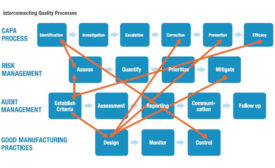Home » audit
Articles Tagged with ''audit''
Remote Quality Management System Audits: An ISO 9001 Auditor’s Perspective and Lessons Learned
Planning in this remote audit environment is paramount.
December 5, 2020
Compliance and Convenience
If done well, a remote audit can be a useful tool.
October 1, 2020
Compliance Gets Results
The path to profitability may involve better audits.
April 1, 2020
A Paradigm Shift in Internal Audits
How the power of teamwork strengthens the internal audit process.
March 15, 2020
Quality Audits: You're Kidding Me!
The auditor determined that it was not precise enough.
March 15, 2020
Understanding How Management Involvement Impacts the Risk of Quality Cost
Here’s a hidden gem in the pursuit of quality.
November 8, 2019
Manufacturing a Quality Medical Device
Quality is nonnegotiable in the medical field.
October 1, 2019
The Real Quality Audit Benefit
Effective quality auditors are catalysts for change
September 15, 2019
Stay in the know with Quality’s comprehensive coverage of
the manufacturing and metrology industries.
eNewsletter | Website | eMagazine
JOIN TODAY!Copyright ©2024. All Rights Reserved BNP Media.
Design, CMS, Hosting & Web Development :: ePublishing














